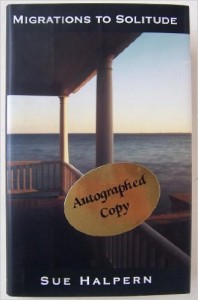Here’s another essay collection, this one from 1992 on the theme of solitude. Halpern says these pieces are not about the right to be left alone or protection of privacy but rather about “the experience of being left alone, or of not being left alone.”
In these essays she interviews, among others, a couple who have chosen to isolate themselves in the woods for 40 years, monks whose order has rules of silence, and a prisoner in and out of solitary confinement. Much has been written lately about the dangers of solitary confinement, its potentially dire consequences. Halpern relates the story of a thirty-two-year-old French woman who in 1989 isolated herself in a cave for 111 days as part of an experiment. A year after completing the experiment, the woman killed herself.
Halpern also interviews homeless people, pointing out the terrible need for privacy in homeless shelters, especially those whose beds are in dormitory rooms. She interviews a woman who has finally moved to an apartment and her fierce joy at having a place where she can close the door.
Although Halpern says these essays are not about political definition of privacy, she does look at government surveillance, still in its early days since this book was published in 1992. She talks about the cross-checking made possible by large government databases and quotes Frank Church on the power that this technological capability would give to a dictator if one ever took over the U.S., something that’s looking all too possible today, during this bizarre presidential election.
Halpern isn’t trying to make an argument or put forth a thesis. She simply introduces us to some people whose stories illustrate the need for, and dangers of, solitude and privacy. Such stories are a good counterbalance to a culture that today seems to privilege the social over the private, where wanting to spend time alone is often considered an indication of mental illness.
What I said most often as a child, what I repeated over and over was Leave me alone. Growing up in a large family meant frazzled, impatient parents and younger siblings tagging along when I tried to escape. Solitude became my vision of paradise. But no matter what white-room fantasies I’ve had, I know that absolute seclusion is not the right thing for me. I’ve found my own balance between being alone and being with others. Society, community: these are needs as well.
As may be obvious, I’m rereading some books that I’ve held onto for a while preparatory to passing them on. It’s time to clean out the bookshelves. Our local free book exchange, The Book Thing, burned down a few months ago, but I still have a few options for giving books away to those who can use them.
Where do you donate books? And what for you are the uses of solitude? What balance have you found between solitude and society?

